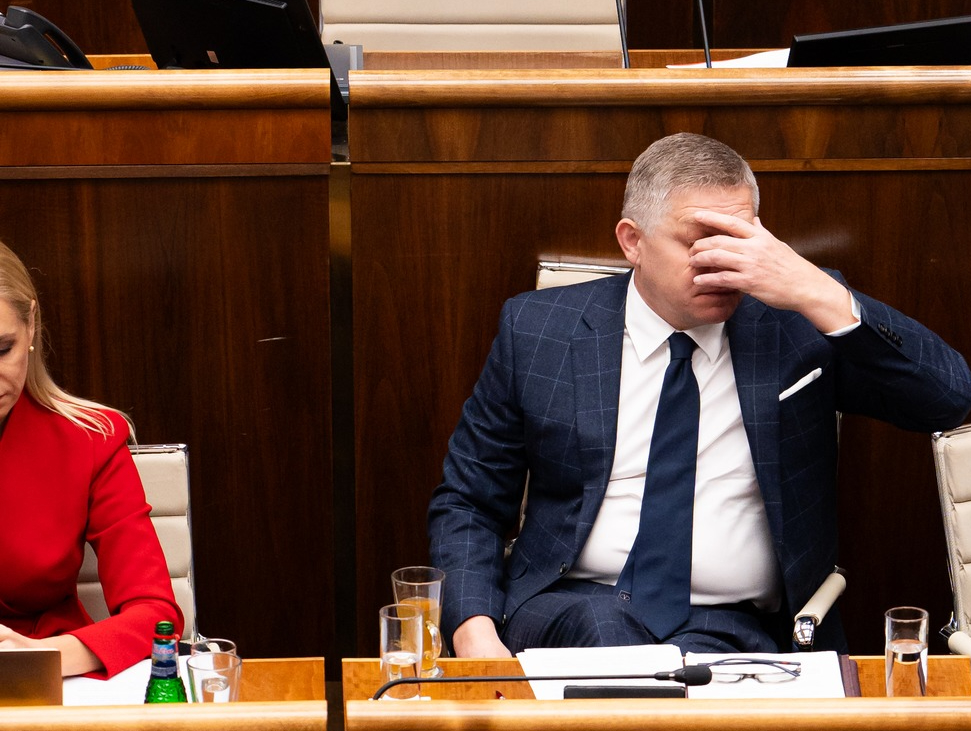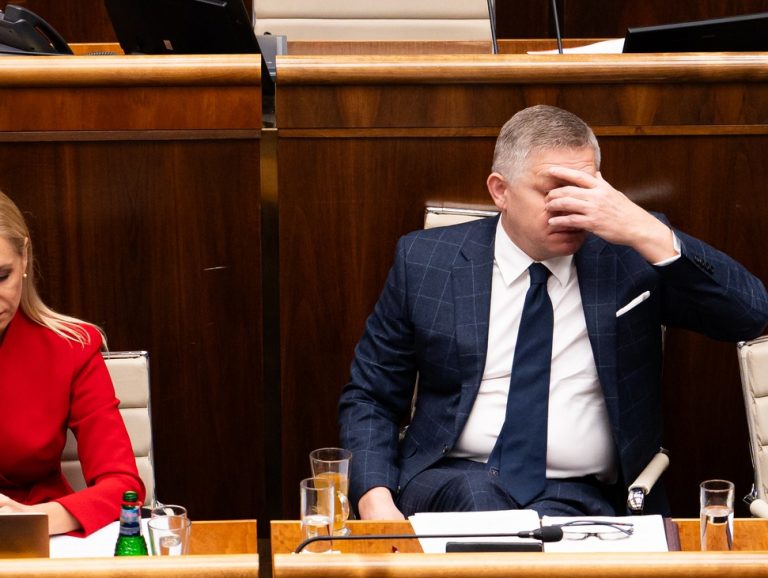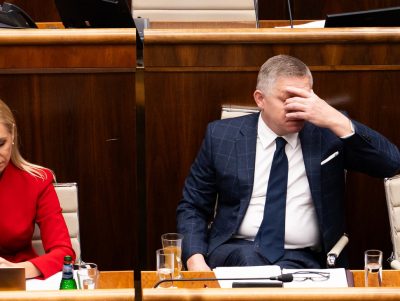Photo: Michal Šimečka's Facebook page 2025-02-06
Photo: Michal Šimečka's Facebook page 2025-02-06
In recent weeks, Slovakia experienced two major cyberattacks on critical infrastructure and nationwide protests with over 100,000 protesters taking to the streets against Prime Minister Robert Fico’s increasingly pro-Russian agenda and diplomatic attacks on Ukraine. A brewing coalition crisis after multiple unsuccessful no-confidence votes left Fico’s cabinet with a wobbly majority. Here’s what unfolded during Slovakia’s turbulent start to 2025.
It took two attempts to open the extraordinary National Council session on February 4. The governing coalition failed to reach a quorum on the first try, falling short by just one vote.
With multiple internal conflicts and MPs switching party affiliations, Slovakia’s opposition says Robert Fico and his cabinet are failing to deliver on pre-election “promises of stability.”
The Council had already debated a motion of no-confidence against the government in January, when Prime Minister Fico unexpectedly presented a classified intelligence report, accusing the opposition of plotting a coup. Opposition parties subsequently withdrew the motion and resubmitted it for the next session, dismissing the intelligence report as part of a “conspiracy” by Fico.
However, since the February 4 session changed its agenda only a few days before convening, the next no-confidence vote is now expected in March.
Cabinet Conflicts as Coalition Loses Majority
Recent internal clashes caused Fico’s coalition to lose two seats after the junior coalition party Hlas expelled two of its own members in January. Those members, Samuel Migaľ and Radomír Šalitroš, later exposed internal bullying practices and alleged “shadow” leadership by Slovak President Peter Pellegrini, the party’s former chairman.
“My colleagues and I noticed suspicious individuals taking an interest in our activities,” Migaľ said in an interview with Denník N, claiming that intelligence officers had been assigned to monitor some members of Parliament.
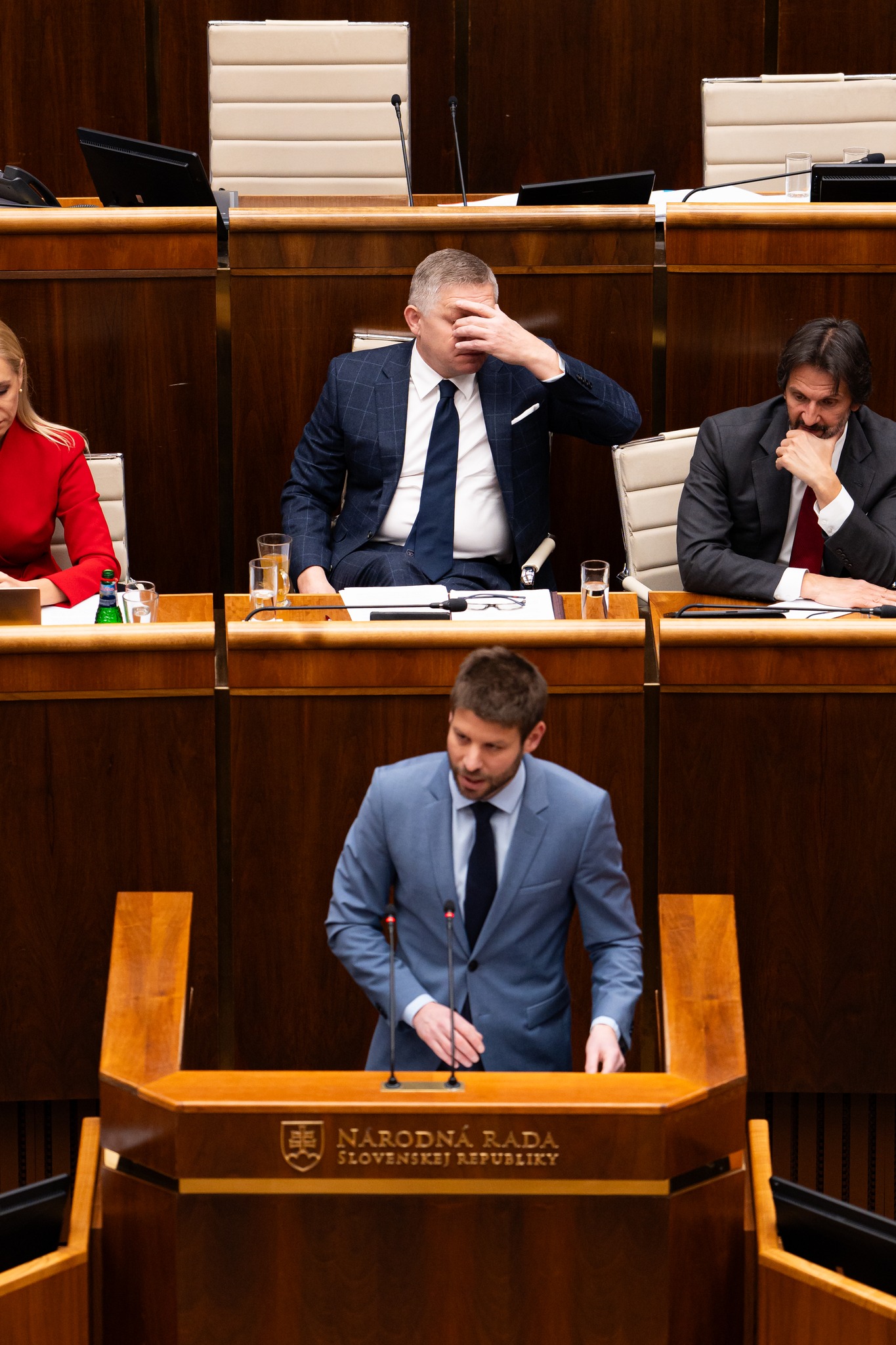
Robert Fico and opposition leader Michal Šimečka during the January 21 National Council meeting. Photo: Šimečka’s Facebook page
This was not the first time Fico’s coalition had shrunk. In October 2024, three independent MPs, led by Rudolf Huliak, left the Slovak National Party’s (SNS) caucus, another junior coalition partner.
That split occurred after Huliak, who also serves as the chairman of the small nationalist party National Coalition, which merged with SNS before the parliamentary elections, demanded more control and key positions in certain ministries. His requests were denied by SNS leader Andrej Danko, who publicly called him a “traitor.”
“We’ve been completely ignored, prevented from attending the coalition council, which has already held two sessions,” Huliak said.
During coalition talks after the 2023 parliamentary election, Robert Fico initially appointed Huliak as a candidate for Minister of Environment, but former President Zuzana Čaputová blocked the nomination, citing Huliak’s climate-change denialism and conflicts of interest with environmental NGOs.
Huliak’s stance on supporting the coalition suddenly shifted at the last minute before Parliament convened in February, and he, along with other independent MPs, ultimately voted to keep Fico’s government in power.
Nationwide Protests Against the Pro-Russian Fico Government
Meanwhile, Fico’s government is facing challenges not only in parliament but also on the streets. In January, around 100,000 protesters gathered across major Slovak cities to support the country’s position in the EU and demand Fico’s resignation over his increasingly anti-EU and pro-Russian stance.
The first wave of demonstrations began in December, following Robert Fico’s visit to Russian President Vladimir Putin. Despite government warnings about an alleged “coup” attempt organized by the Slovak opposition and foreign actors, the protests remained peaceful.
Organized with the help of the “Peace for Ukraine” initiative, protesters pushed back against Fico’s cabinet’s consolidation of power and demanded that the government uphold the rule of law and stop “dividing society” for political gain. According to protest organizers, Fico’s actions are taking Slovakia further away from the EU.
In addition to street protests, various sectors of society have signed open letters addressed to the government and Fico himself.
Over 850 psychologists and psychiatrists signed a letter to Fico, calling out his emotional instability and undemocratic political actions. They compared the letter to one sent to Vladimír Mečiar in 1998, urging self-reflection and suggesting he consider leaving politics.
Another open letter, signed by over 6,200 teachers and educators, criticized the government’s policies in the education sector. The academic community from universities gathered more than 2,500 signatures for a letter of their own, while students and youth received support from over 2,700 signatories.
Other groups that have published open letters include entrepreneurs and employers, Slovak Scouts, members of the Slovak Conservation Association, and the Council of the Brethren Church in the Slovak Republic.
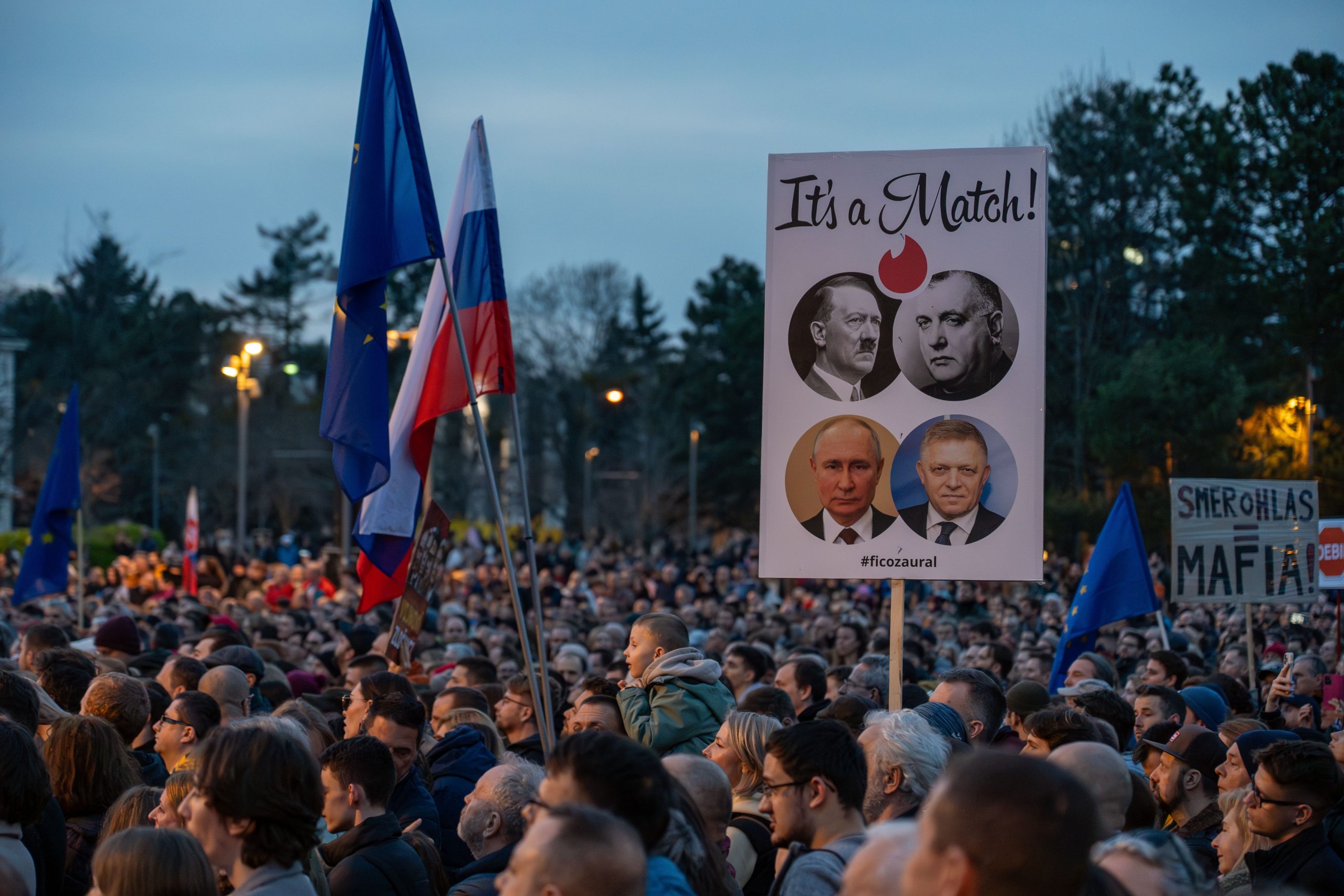
Anti-government protest in Bratislava. Photo: Shutterstock
Alleged ‘Coup Plot’ and Spying on Activists
Fico compared the anti-government demonstrations to Ukraine’s 2014 Maidan uprising, accusing protesters and opposition leaders of attempting to “overthrow the government.” Just days before, he alleged that protesters were planning to “occupy government buildings and prevent the execution of government power,” citing a questionable intelligence report that was presented to MPs right before the opposition’s first no-confidence vote attempt.
The report was unexpectedly introduced just before the no-confidence vote was scheduled for January 21. During his speech, Fico abruptly requested that the session be closed to the public and presented a confidential intelligence report, effectively blocking the vote.
One of the key claims in the intelligence report, which allegedly outlined an “influence operation aimed at destabilizing Slovakia,” was an email sent by the regional initiative “Not in Our City”—a group that works against radicalization, hate toward vulnerable groups, and the normalization of extremism in politics.
According to the author of the email, it contained an AI-generated list of ideas and suggestions that was shared with approximately 130 other NGOs across the country. The initiative later published the full letter on its Facebook page.
It is worth noting that this intelligence report was produced by the Slovak Intelligence Agency (SIS), whose director, Pavol Gašpar, is the son of former police chief and current Smer MP Tibor Gašpar. Tibor Gašpar remains under multiple criminal charges, including membership in an organized criminal group.
Tibor Gašpar was also a key figure in drafting Fico’s highly controversial Criminal Code Amendment, which reduced the statute of limitations and forced prosecutors to drop multiple corruption cases.
Opposition members dismissed Fico’s claims as the desperate ramblings of a panicked politician, while also condemning the intelligence agency’s possible surveillance of anti-government activists.
The opposition resubmitted the no-confidence motion ahead of the upcoming parliamentary session on January 28, but the session failed to open after the coalition blocked the quorum.
“Georgian Conspiracy”
Fico and his coalition partners intensified their attacks on the anti-government demonstrators, accusing the organizers of receiving assistance from Ukrainian intelligence just hours before the protests.
Using a 2023 photo of Mamuka Mamulashvili, the commander of Ukraine’s Georgian Legion, alongside Lucia Štasselová, an organizer of the “Peace for Ukraine” initiative, during a public debate, Fico attempted to link the military unit to citizen activists.
“This is what a peaceful protester looks like,” he said sarcastically, displaying a photograph of Mamulashvili in military uniform. “These are not lollipops,” he added, pointing at Mamulashvili’s tactical gear.
A second photograph showed writer and journalist Martin Milan Šimečka, the father of Progressive Slovakia chairman and opposition leader Michal Šimečka, with Mamulashvili during a visit to Ukraine, where they were delivering mobile ambulances funded by Slovak donations.
Mamulashvili dismissed the accusation that he played any role in organizing civil protests in Slovakia.
“Behind these demonstrations clearly stands Progressive Slovakia,” Fico claimed at a press conference last Friday, blaming the media for supporting the protests. He also linked the demonstrations to recent cyberattacks, including one targeting the state land registry and another hitting Slovakia’s largest insurance company. However, he did not provide any evidence for these claims.
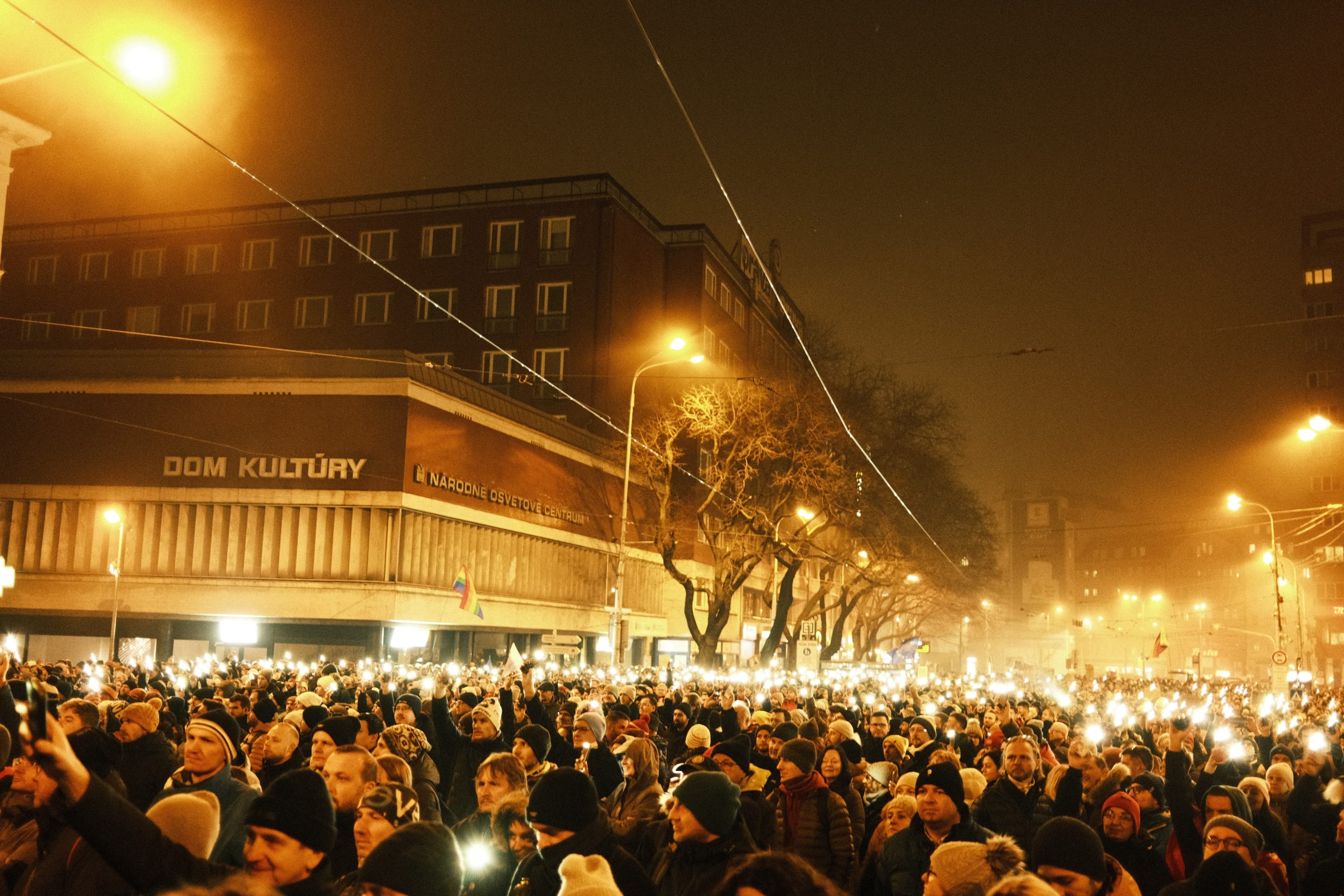
Anti-government protest in Bratislava. Photo: Shutterstock
Two Major Cyberattacks Within a Month
On Sunday, January 5, unknown attackers hacked and infiltrated Slovakia’s land registry system in a confirmed ransomware attack.
Minister of Agriculture Richard Takáč called it an unprecedented attack on national infrastructure, which caused a massive outage of services, affecting banking, real estate transactions, and legal services. A similar attack occurred around the same time on Russia’s Land Registry system. Minister of Interior Matúš Šutaj-Eštok suggested that, based on intelligence sources, there could be a connection between the incidents.
The land ownership registry system, managed by The Office of Geodesy, Cartography, and Land Registry (UGKK), contains crucial data on land and property ownership. Subsequent findings revealed that the system had serious security vulnerabilities, flagged in an audit conducted three months earlier.
External experts identified that some servers had not been updated since 2015, which may have contributed to the attack. According to UGKK, the registry was linked to the national penetration testing system “Achilles,” which experts argue should have detected these vulnerabilities.
Weeks after the attack, most local land registry offices had reopened, though many online services remained limited as infrastructure continued to recover.
According to some sources, the attackers initially demanded $12 million, which the government negotiated down to $6 million but allegedly refused to pay.
In their public announcement, Prime Minister Fico and Minister of Interior Matúš Šutaj-Eštok reiterated that the attackers may have originated from Ukraine, though they provided no evidence to support this claim.
Approximately two weeks after the land registry attack, another cyberattack targeted Slovakia’s Public Health Insurance Company (VšZP). Minister of Health Kamil Šaško and Fico announced the incident at a press conference, where Fico claimed that attackers attempted to access sensitive personal information about patients and medical procedures.
According to VšZP, the large-scale DDoS attack was unsuccessful, and patient data remained secure. However, at the same time, VšZP clients reported receiving multiple phishing attempts via SMS. A denial-of-service (DoS) attack floods a website or service with an overwhelming number of automated requests, disrupting access for legitimate users.
As with the land registry attack, Fico and his cabinet were quick to blame the opposition and the media, accusing them of “spreading chaos and fear.”
Russian Pipe Dreams
Meanwhile, tensions between Slovakia and Ukraine continue to rise. On January 1, 2025, Ukraine halted Russian gas transit to its western neighbors after its Gazprom deal expired. Kyiv’s decision, announced during the European Council meeting in December, dealt a blow to Russia’s revenue, which helps fund its ongoing war against Ukraine.
According to Fico, the decision would cost Slovakia 500 million euros in “onward transit fees,” as reported by Reuters. The prime minister called President Volodymyr Zelensky an “enemy” of Europe and warned of possible retaliation by “lowering Slovakia’s aid to Ukraine” and “cutting electricity supplies.” Zelensky responded that his government had offered to assist with the transition before the announcement, but Fico ignored it. Slovakia profits from gas transmission fees through Eustream, a company that is 51% state-owned. However, its revenues have declined since the beginning of Russia’s invasion of Ukraine. The latest available figure for 2023 showed total revenue of 226 million euros from gas transmission services. Fico did not clarify where he got the 500-million-euro estimate he shared with the public.
Following this, Fico held talks with Russian President Vladimir Putin, making him one of the few EU leaders to visit Russia since the invasion of Ukraine. Fico stated that the meeting covered the possible continuation of gas supplies and “bilateral” relations, though he did not provide any official statements on the outcomes. Zelensky later commented that “murky schemes” with Putin pose a security threat to the entire EU.
In January, a Slovak delegation that included SNS leader Andrej Danko and Tibor Gašpar also visited Moscow, this time attending the Russian Duma. Danko posted videos from Russian stores, comparing prices and showcasing what he called the “prosperous life in Russia.”
The Slovak government and its cabinet members have been increasingly vocal in their criticisms of Ukraine and President Zelensky, frequently echoing pro-Russian narratives. However, when Tibor Gašpar proposed a constitutional “backdoor” that could allow Slovakia to leave the EU and NATO if necessary, it sparked a public backlash, leading to major protests.
The next round of large-scale protests is planned for February 7.
Subscribe to “Goulash”, our newsletter with original scoops and the best investigative journalism from Central Europe, written by Szabolcs Panyi. Get it in your inbox every second Thursday!

